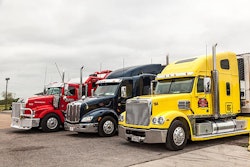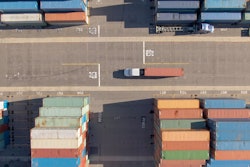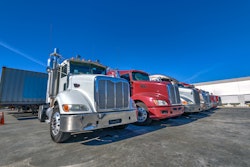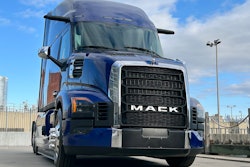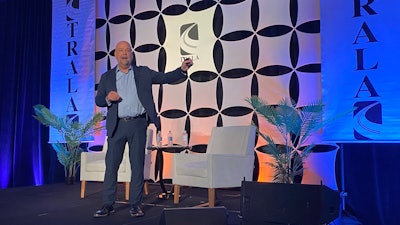
Editor’s note: This article was published on April 8, before President Trump announced on April 9 he would pause his reciprocal tariffs plan to address trade deficits.
It was starting to get better. You might have noticed it. Speaking Tuesday at the Truck Renting and Leasing Association (TRALA) Annual Meeting in Doral, Fla., ATA Chief Economist Bob Costello said there was a brief period in the first quarter where macroeconomic indicators were trending up for trucking.
The freight recession had finally stopped (or was at least paused) as capacity neared equilibrium, while manufacturing and housing starts were on the rise and consumer spending was drifting back toward goods after three years dominated by service purchasing.
Then the tariffs started.
“I really thought we were coming out [of the freight recession] as an industry. The economy as a whole was slowing down before the tariffs, but the things that drive truck freight were moving in the opposite direction,” Costello said. “I thought things were going to get better.”
Now, it’s hard to say.
President Trump’s tariff agenda could bolster American manufacturing in the years to come but today will only raise prices and pressure supply chains, Costello said. Additionally, with 70 countries eager to negotiate trade deals in response to Trump’s Liberation Day activity, it’s possible many of the tariffs announced last week could be amended or revoked in the days to come.
As an economic forecaster, Costello said that would be ideal. The stock market bounced back a little Tuesday behind that hope. Costello said he believes there is still time for the Trump administration to replace its blanket tariffs with more pointed and targeted actions that would remove a lot of market uncertainty and help reduce a recession risk for the U.S. economy that rose to nearly 60% last week.
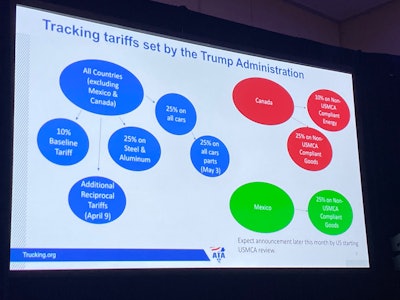 A chart of tariffs imposed by President Trump in 2025.
A chart of tariffs imposed by President Trump in 2025.
For an industry still recovering from a recession of its own, Costello said trucking would benefit substantially from a course reversal after last week’s actions. The recent freight recession wasn’t the most severe in industry history from a losses perspective, but at 27 months it was uncharacteristically long. Another recession could be devastating for carriers who were finally starting to swim again after years of treading water.
“If the administration backed off quickly and said they got what they wanted, it would help us get back on track to where we were hoping to be,” he said.
[RELATED: Volvo's Voorhoeve sees opportunity for lease and rental operations in uncertainty]
Unfortunately, until that occurs Costello said economists must forecast for the current chaotic environment. For him, that meant spending last Friday revising down projections for most of the measures that drive truck freight, shifting expectations for the rest of 2025 from modest, stable growth to market stasis or contraction.
Pre-tariffs, Costello said ATA was predicting U.S. GDP growth at 1.4% for 2025, with the final three quarters of the year at 1.2%, 1.6% and 2.1%, respectively. As of Friday, those numbers have fallen to 0.3% for the year, with 0.5%, 0.3% and 0% for the final three quarters.
Industry numbers aren’t any better. Factory output levels were revised from 1.3% and 2.5% in 2025 and 2026 to -1.0% and -0.8%. Consumer spending on goods was slashed to 0.5% and 0.6% when both had previously been over 2.0%. Housing starts also were reduced.
Yet disappointing as those numbers appear, Costello also warned the TRALA audience to be cautious business planning around them. The Trump administration has been nothing if not frenetic. Costello said ATA is time stamping its forecasts now because the administration’s actions force them to make revisions so often. He said any changes around tariffs, good or bad, will force more changes that make the data he shared Tuesday obsolete.
And Costello said he hopes the next changes are good ones, because he still thinks a trucking rebound is possible if macroeconomic factors realign to pre-tariff positions.
“Excluding the tariffs for a moment, things were starting to move in the right direction. It was going to get a little bit better and fleets were going to feel a little bit better,” he said.
Port call fees incoming?
Costello also used Tuesday’s presentation to alert the TRALA audience to the possible port call fees coming for Chinese boats and shipping companies as a result of a Biden-era investigation into Chinese shipbuilding and maritime practices. Costello said the Biden administration concluded in January that China had used unfair practices to give its maritime industry a competitive advantage, and proposed several severe penalties to fight back and increase global maritime competitiveness.
The Trump administration released the recommended penalties list earlier this year, in which Biden’s U.S. Trade Representative (USTR) recommended penalties of $1 to $3 million per port call for Chinese or China-linked ships.
Costello said these penalties could cripple imports into many American ports if enacted, though it was reported just hours after Costello’s presentation that the Trump administration is considering delaying and reducing those fees amid strong pushback.




